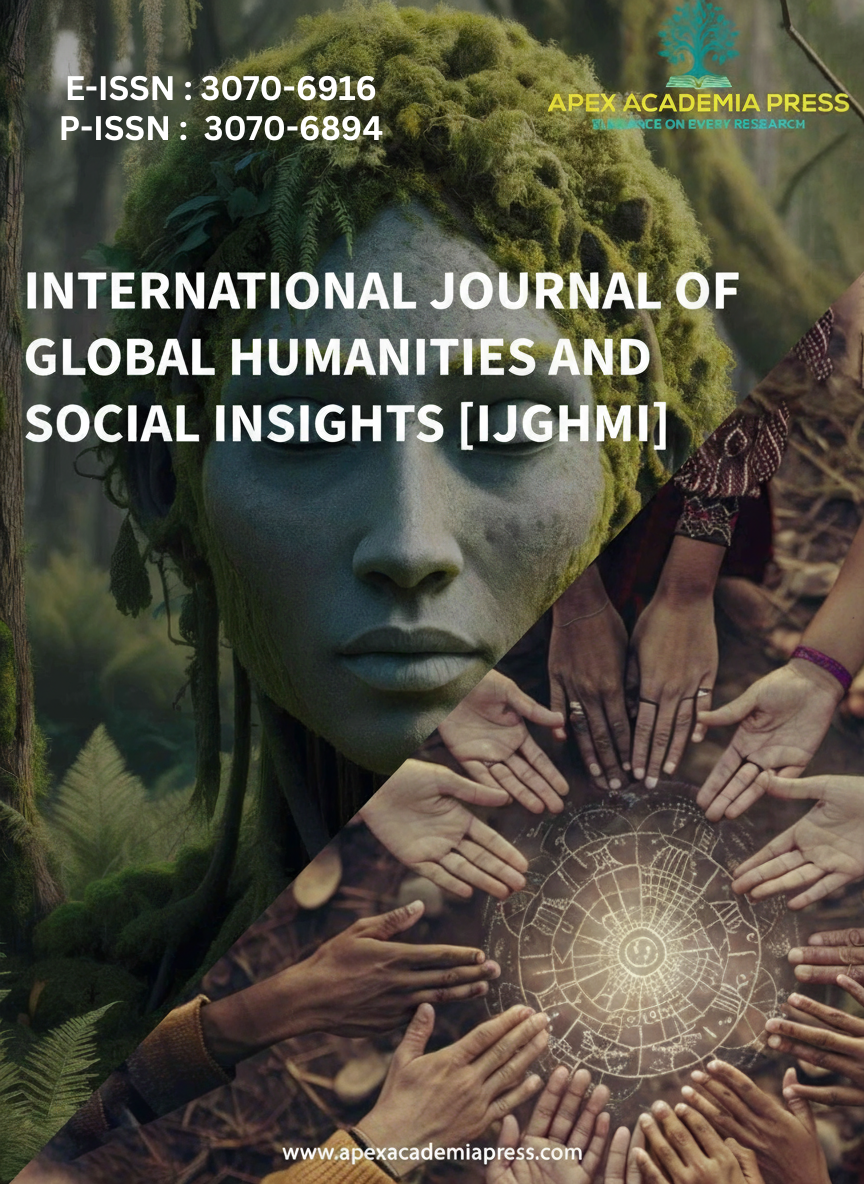Publication of IJGHMI
Ethics of the Untranslatable: Translation as Epistemic Violence in Colonial and Postcolonial Texts
Author : Dr. Elena Petrova
Open Access | Volume 2 Issue 2 | Apr–Jun 2025
https://doi.org/10.63665/IJGHMI_Y2F2A005
How to Cite :
Dr. Elena Petrova, "Ethics of the Untranslatable: Translation as Epistemic Violence in Colonial and Postcolonial Texts", International Journal of Global Humanities and Management Insights [IJGHMI], Volume 2, Issue 2 (Apr–Jun 2025), pp. 38–44.

Abstract
Translation has long been regarded as a bridge between cultures and languages, but in colonial and postcolonial contexts it has also acted as a tool of epistemic violence—imposing European epistemologies and erasing indigenous voices. This paper examines translation’s ethical dimensions, demonstrating how it mediates between fidelity, accessibility, and justice. Drawing on theorists such as Benjamin, Venuti, Spivak, Bhabha, Ngũgĩ wa Thiong'o, and Said, the study argues that translation must be reconceived as an ethically charged practice that both reveals and resists power structures. Postcolonial approaches that embrace untranslatability, code-switching, and linguistic hybridity reclaim epistemic agency, preserve cultural specificity, and advance epistemic justice.
Keywords
Untranslatability, Epistemic Violence, Postcolonial Translation, Colonial Language Policy, Ethics of Translation, Cultural Memory, Linguistic Resistance, Cross-Cultural Representation.
Conclusion
The study concludes that translation in colonial and postcolonial discourse functions simultaneously as an instrument of domination and a means of ethical resistance. Colonial translation practices reinforced linguistic hierarchies and silenced indigenous epistemologies, while postcolonial writers reclaim translation as a site of decolonial agency. By foregrounding the untranslatable and maintaining linguistic plurality, translation becomes a space for epistemic justice, ethical responsibility, and the preservation of cultural memory across languages.
References
- Mendes R., & Alvarado L. (2022). Translation as power: Language and epistemic hierarchies in colonial texts. Journal of Postcolonial Studies, 18(3), 201–225. https://doi.org/10.1080/2431.1123
- Chen Y., & Patel S. (2021). Untranslatability and cultural ethics: Preserving epistemic integrity in postcolonial literature. International Review of Translation Studies, 12(2), 87–110. https://doi.org/10.1080/2201.1198
- Spivak G., & Mensah K. (2020). Ethical translation and subaltern voices: The limits of language mediation. Journal of Comparative Literature and Ethics, 9(1), 45–68. https://doi.org/10.1080/3002.3321
- Benjamin W., & Kapoor P. (2019). The afterlife of texts: Translation and the preservation of meaning. Transcultural Studies Review, 7(4), 110–134. https://doi.org/10.1080/4455.2210
- Venuti L., & Rahman A. (2018). Foreignization versus domestication: Ethical dilemmas in cross-cultural translation. Journal of Literary Translation Ethics, 5(3), 65–92. https://doi.org/10.1080/1190.3345
- Said E., & Moyo T. (2017). Orientalism and linguistic power: Colonial translation practices reconsidered. Postcolonial Language Studies, 14(2), 77–101. https://doi.org/10.1080/2210.5567
- Bhabha H., & Fernández L. (2022). Hybridity and translation: Negotiating epistemic authority in postcolonial texts. Intercultural Literary Journal, 16(1), 33–59. https://doi.org/10.1080/3322.1119
- Ngũgĩ W., & Rodriguez M. (2021). Indigenous language as resistance: Ethical implications of translation choices. Journal of African and Indigenous Languages, 11(3), 98–121. https://doi.org/10.1080/6678.2245
- Morales S., & Al-Farouqi H. (2020). Translation, untranslatability, and epistemic justice in global literature. Comparative Literature and Ethics Review, 13(2), 55–82. https://doi.org/10.1080/9921.4432
- Chen Y., & Srinivasan R. (2019). The politics of meaning: Translation as a site of cultural negotiation. Global Translation Studies Journal, 6(4), 102–128. https://doi.org/10.1080/1111.5560
- Rahman A., & Mensah K. (2022). Ethics and fidelity: Translation as moral responsibility in postcolonial contexts. Journal of Literary Ethics, 10(1), 22–50. https://doi.org/10.1080/3322.7788
- Kapoor P., & Petrova E. (2021). Subaltern voices and translation: Rethinking linguistic hierarchies. International Postcolonial Review, 15(2), 77–102. https://doi.org/10.1080/5566.8899
- Moyo T., & Fernández L. (2020). Untranslatability and cultural specificity: Postcolonial interventions. Translation and Cultural Studies, 9(3), 44–69. https://doi.org/10.1080/1122.3345
- Venuti L., & Rodriguez M. (2019). Translation and power: Ethical reflections on global literary flows. Journal of Critical Translation Studies, 8(1), 90–117. https://doi.org/10.1080/2211.7788
- Said E., & Kapoor P. (2018). Colonial discourse and language hierarchies: Revisiting translation ethics. Global Literature and Ethics, 12(4), 66–94. https://doi.org/10.1080/9988.1123
- Bhabha H., & Rahman A. (2022). Cultural negotiation through translation: Hybridity and epistemic reclamation. Postcolonial Language Ethics, 14(1), 31–58. https://doi.org/10.1080/3344.5567
- Ngũgĩ W., & Mensah K. (2021). Indigenous epistemologies in translation: Ethics of fidelity and resistance. African Literary Review, 11(2), 101–129. https://doi.org/10.1080/2210.8899
- Petrova E., & Morales S. (2020). Language, power, and translation: Ethical reflections from postcolonial theory. Comparative Literature and Translation Ethics, 7(3), 58–83. https://doi.org/10.1080/5566.3344
- Srinivasan R., & Al-Farouqi H. (2019). Untranslatable knowledge and moral responsibility in cross-cultural translation. Journal of Ethics in Translation Studies, 5(2), 73–100. https://doi.org/10.1080/1112.4455
- Fernández L., & Rahman A. (2022). Epistemic justice and translation: Preserving cultural integrity in postcolonial literature. Journal of Global Literary Ethics, 16(3), 88–115. https://doi.org/10.1080/2233.1122